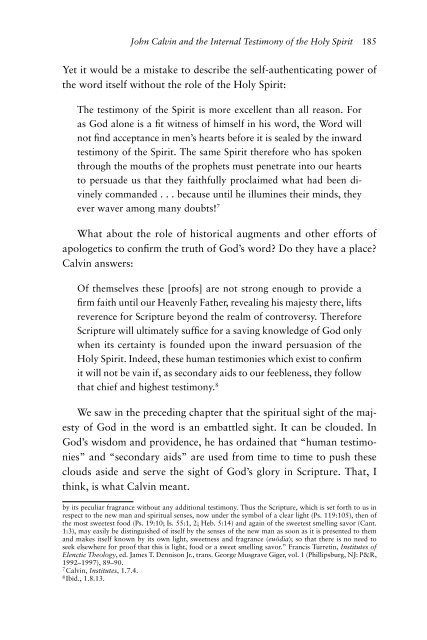Scriptures selfattesting authority question doctrine truthfulness Scriptures
peculiar-glory-en
peculiar-glory-en
You also want an ePaper? Increase the reach of your titles
YUMPU automatically turns print PDFs into web optimized ePapers that Google loves.
John Calvin and the Internal Testimony of the Holy Spirit 185<br />
Yet it would be a mistake to describe the self-authenticating power of<br />
the word itself without the role of the Holy Spirit:<br />
The testimony of the Spirit is more excellent than all reason. For<br />
as God alone is a fit witness of himself in his word, the Word will<br />
not find acceptance in men’s hearts before it is sealed by the inward<br />
testimony of the Spirit. The same Spirit therefore who has spoken<br />
through the mouths of the prophets must penetrate into our hearts<br />
to persuade us that they faithfully proclaimed what had been divinely<br />
commanded . . . because until he illumines their minds, they<br />
ever waver among many doubts! 7<br />
What about the role of historical augments and other efforts of<br />
apologetics to confirm the truth of God’s word? Do they have a place?<br />
Calvin answers:<br />
Of themselves these [proofs] are not strong enough to provide a<br />
firm faith until our Heavenly Father, revealing his majesty there, lifts<br />
reverence for Scripture beyond the realm of controversy. Therefore<br />
Scripture will ultimately suffice for a saving knowledge of God only<br />
when its certainty is founded upon the inward persuasion of the<br />
Holy Spirit. Indeed, these human testimonies which exist to confirm<br />
it will not be vain if, as secondary aids to our feebleness, they follow<br />
that chief and highest testimony. 8<br />
We saw in the preceding chapter that the spiritual sight of the majesty<br />
of God in the word is an embattled sight. It can be clouded. In<br />
God’s wisdom and providence, he has ordained that “human testimonies”<br />
and “secondary aids” are used from time to time to push these<br />
clouds aside and serve the sight of God’s glory in Scripture. That, I<br />
think, is what Calvin meant.<br />
by its peculiar fragrance without any additional testimony. Thus the Scripture, which is set forth to us in<br />
respect to the new man and spiritual senses, now under the symbol of a clear light (Ps. 119:105), then of<br />
the most sweetest food (Ps. 19:10; Is. 55:1, 2; Heb. 5:14) and again of the sweetest smelling savor (Cant.<br />
1:3), may easily be distinguished of itself by the senses of the new man as soon as it is presented to them<br />
and makes itself known by its own light, sweetness and fragrance (euōdia); so that there is no need to<br />
seek elsewhere for proof that this is light, food or a sweet smelling savor.” Francis Turretin, Institutes of<br />
Elenctic Theology, ed. James T. Dennison Jr., trans. George Musgrave Giger, vol. 1 (Phillipsburg, NJ: P&R,<br />
1992–1997), 89–90.<br />
7<br />
Calvin, Institutes, 1.7.4.<br />
8<br />
Ibid., 1.8.13.


